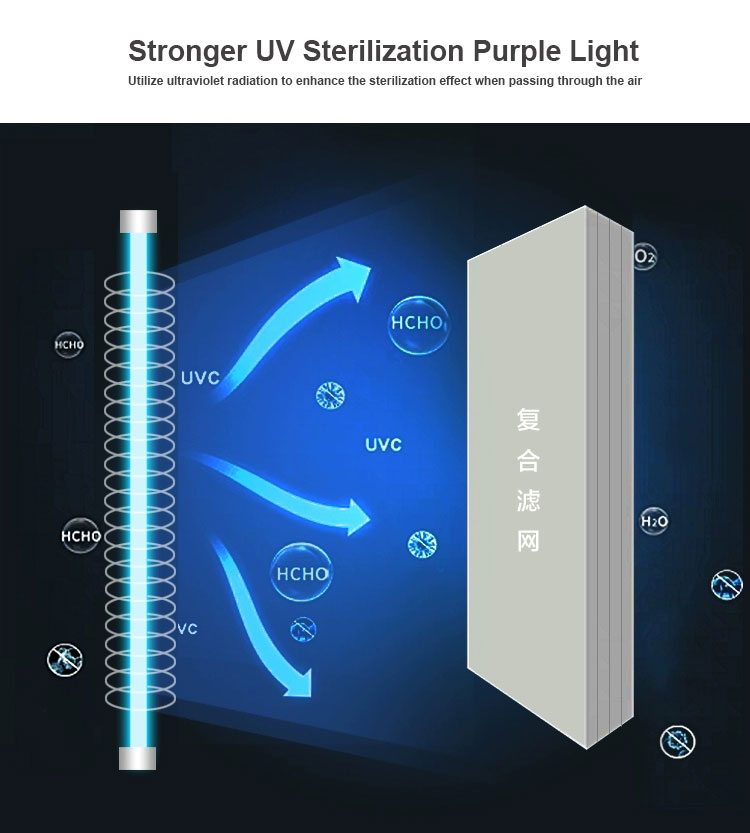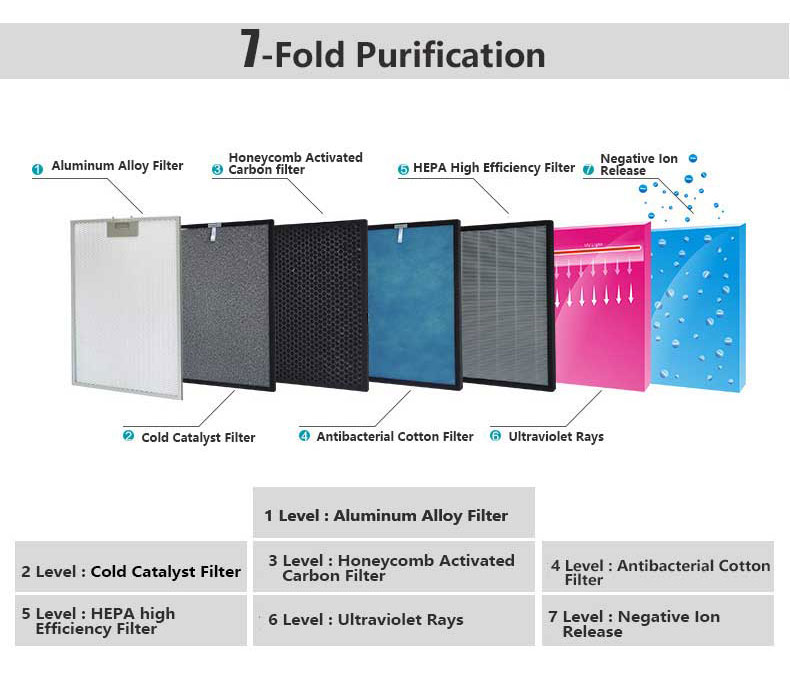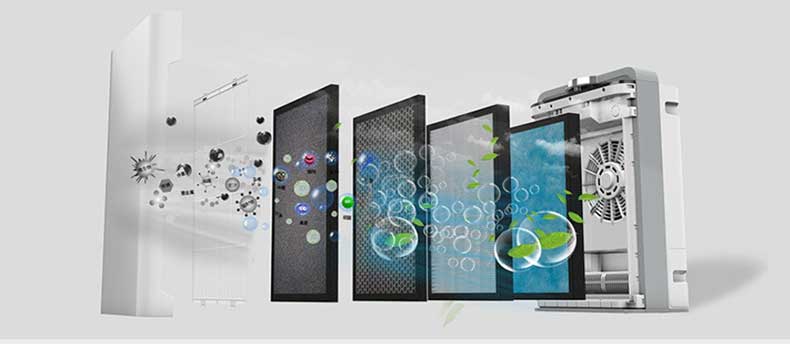+86-18927501869
- All
- Product Name
- Product Keyword
- Product Model
- Product Summary
- Product Description
- Multi Field Search
 English
EnglishViews: 1167 Author: Allen Yi Publish Time: 2024-04-25 Origin: Site
The COVID-19 pandemic completely changed how we think about air quality. Suddenly, the air we breathe indoors became a serious health concern. People began to realize that invisible airborne particles — including viruses, bacteria, allergens, and pollutants — can easily circulate through our homes, offices, and schools.
That's where the air purifier comes in. Once considered a luxury appliance, it has now become a necessity for modern living. A reliable HEPA air purifier can drastically improve indoor air quality, protect your family's health, and even reduce the risk of airborne virus transmission.
But how exactly do air purifiers help kill or capture viruses like COVID-19? And which types are best suited for homes, offices, or pet owners? Let's break it down scientifically, but in a simple and easy-to-understand way.

Viruses like SARS-CoV-2 (the virus that causes COVID-19) primarily spread through tiny droplets and aerosols released when people breathe, talk, cough, or sneeze. These microscopic particles can linger in the air for hours, especially in poorly ventilated areas.
This is why traditional cleaning methods — like wiping surfaces or using disinfectant sprays — aren't enough to protect against airborne viruses. Even if every surface is spotless, the air itself can remain contaminated.
Air purifiers, especially those equipped with HEPA filters and UV-C sterilization, play a crucial role here. They don't just mask odors or remove dust; they actively capture, trap, and neutralize harmful microorganisms in the air, reducing exposure and lowering infection risks indoors.
At their core, air purifiers are built around a simple but powerful idea: continuously pulling in contaminated air, filtering out pollutants, and releasing clean, purified air back into the environment.
Most purifiers combine multiple layers of filtration to handle different types of particles:
• Pre-Filters: Capture large dust, pet hair, and debris.
• HEPA Filters: Trap 99.97% of airborne particles as small as 0.3 microns — including viruses, bacteria, pollen, and smoke.
• Activated Carbon Filters: Absorb odors, volatile organic compounds (VOCs), and toxic gases.
• UV-C Lamps (Optional): Destroy pathogens at the DNA level, effectively neutralizing bacteria and viruses that pass through the unit.
When combined, these technologies make modern air purifiers a reliable first line of defense against invisible airborne threats — including viruses like COVID-19.
The HEPA air purifier is widely recognized as one of the most effective devices for filtering out virus-sized particles. HEPA stands for "High-Efficiency Particulate Air," and its design ensures that even microscopic contaminants are trapped.
COVID-19 particles are approximately 0.1 microns in diameter — smaller than the HEPA standard (0.3 microns). However, studies show that HEPA filters can still capture them effectively due to a combination of diffusion, interception, and impaction mechanisms.

Here's how it works:
• Diffusion: Tiny virus particles move erratically and collide with HEPA fibers, sticking to them.
• Interception: Particles following the airflow are intercepted by filter fibers.
• Impaction: Larger particles directly hit and adhere to the filter material.
Together, these processes create a highly efficient filtration barrier, capable of removing over 99% of airborne viruses, including SARS-CoV-2 aerosols.
While HEPA air purifiers are exceptional at trapping viruses and fine dust, some airborne pathogens may remain viable. This is where UV-C light technology and activated carbon filters play an essential supporting role.
UV-C Light: Destroying Germs at the Molecular Level
UV-C light (short-wavelength ultraviolet radiation between 200–280 nanometers) has been proven effective at deactivating microorganisms by damaging their DNA and RNA, preventing them from reproducing. Many advanced air purifier models integrate UV-C sterilization chambers that treat the air as it passes through the unit.
This dual approach — filtration plus sterilization — ensures not only that harmful particles are captured, but also that viruses like SARS-CoV-2, influenza, and bacteria are rendered inactive. In other words, HEPA filters trap them, and UV-C finishes the job.
Activated Carbon: Removing Odors and Toxic Gases
In addition to microbial threats, modern homes face another challenge: chemical pollutants and unpleasant odors. Activated carbon filters are designed to absorb these harmful substances, including:
• Volatile organic compounds (VOCs) are released by paints, cleaning agents, and plastics.
• Smoke particles from cooking, tobacco, or wildfires.
• Pet odors and ammonia from litter boxes.
This makes carbon filtration especially valuable for families, pet owners, and anyone sensitive to smells or airborne chemicals. A HEPA and carbon air purifier combination provides all-around protection — from viruses to VOCs.

The air purifier benefits extend far beyond COVID-19 prevention. Clean indoor air is fundamental to better health, comfort, and productivity. Here are some of the most significant advantages of using a high-quality air purifier every day:
For people suffering from allergies or asthma, airborne allergens like pollen, dust mites, and mold spores can trigger respiratory discomfort. A HEPA air purifier continuously captures these irritants, helping users breathe easier and sleep better.
Whether it's cigarette smoke, wildfire residue, or cooking fumes, a good air purifier for smoke can dramatically reduce harmful particles and lingering odors. HEPA and activated carbon filters work together to purify the air and make it fresh again.
Airborne germs can easily spread in offices, hospitals, and crowded indoor spaces. Using a UV-C air purifier adds an extra layer of safety by neutralizing airborne viruses and bacteria — protecting employees, patients, and families alike.
Pet lovers know that fur, dander, and odor control can be a constant battle. The best air purifiers for homes with pets are designed with strong suction, pre-filters, and HEPA technology that efficiently remove pet-related particles and odors — keeping both humans and pets healthier.
Poor air quality can lead to fatigue, headaches, and brain fog. Cleaner air means better oxygen levels and improved focus. Many users report sleeping more soundly after using an air purifier regularly in the bedroom or office.
With so many models available, selecting the right air purifier can feel overwhelming. The key is understanding your space, lifestyle, and specific air quality needs.
A compact HEPA air purifier with carbon filtration is ideal for most homes and apartments. Look for features like adjustable fan speeds, quiet operation, and energy efficiency.
The best air purifiers for homes with pets come with advanced pre-filters to capture hair and dander, and carbon layers to remove lingering pet smells. Regular cleaning and filter replacement are crucial to maintaining peak performance.
If you live in an area affected by smoke or pollution, or if you cook frequently, choose a HEPA + carbon air purifier for smoke. Some models even include plasma or ionization technologies to neutralize lingering smoke particles.
Consider a whole-home air purifier or whole-house air purifier system. These connect directly to your HVAC system, purifying every room at once. It's a cost-effective and powerful solution for large spaces, ensuring consistent clean air throughout your property.
To get the most from your air purifier, regular maintenance is key. Even the best system can lose efficiency if filters are clogged or components are neglected.
Here are a few essential tips:
Replace HEPA filters every 6–12 months, depending on air quality and usage.
• Clean pre-filters regularly to remove dust and pet hair buildup.
• Check UV-C bulbs annually — they lose intensity over time.
• Position the purifier correctly: avoid corners and ensure airflow circulation.
By following these steps, you'll ensure your device continues providing maximum protection — whether against viruses, allergens, or smoke.
For further reading and to deepen your understanding of air purification and personal hygiene, consider these related articles:
• What is Cold Catalyst Sterilization Air Purifier? Learn More
• How to Use Alcohol Cleaning Wipes for Post-COVID-19 Protection? Learn More
• How to Choose the Best Natural Baby Wipes for Sensitive Skin? Learn More
Our Customers Always Come First
Trust is the Foundation of Our Service
sales@clean-wipe.com
sywipe@clean-wipe.com
Room 4611, No. 372 Huanshi East Road, Yuexiu District, Guangzhou,China.
+86-18927501869 / +86-20-81608597
/ +86-18927501869